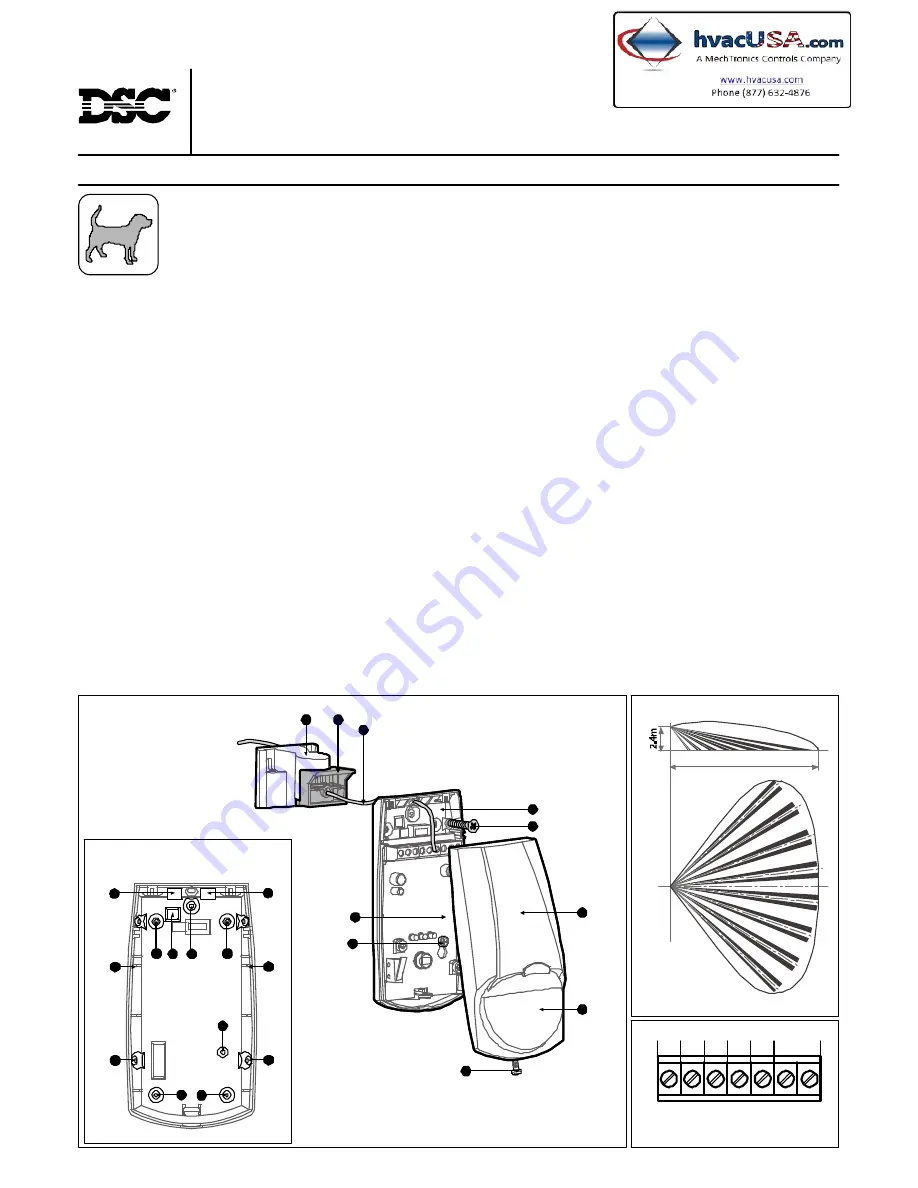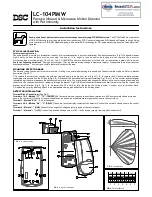
Installation Instructions
LC-104PIMW
Passive Infrared & Microwave Motion Detector
with Pet Immunity
A new generation of professional movement spread spectrum analyzing PIR & MW detectors.
The LC-104PIMW is a combination
of PIR & MW detectors, providing protection from intruders by PYRO sensor element and MW (based on Doppler concept). Using
micro controller for PIR & MW signal analyzing, with special ASIC technology for PIR pulse processing, assures “false alarm free”
operation.
TYPICAL INSTALLATION
Select mounting location
Choose a location most likely to intercept an intruder. (Our recommendation is a corner installation). See detection pattern (Fig.3). The quad-element
high quality sensor detects motion cr os sing the beam; it is sli ghtly less s ens itive detecting motion tow ard the detec tor.
R ecommended mounting height 1.8m-2.4m. The LC-104PIMW performs best w hen provided with a constant and stable environment.
Avoid
the Following Locations
*
Facing direct sunlight.
*
Facing areas that may change temperature rapidly.
*
Areas where there are air ducts or
substantial airflows.
*
Avoid screen, curtain that may block detection area.
MOUNTING DETECTOR BASE
The detector can either be wall or corner mounted. If ceiling or special wall mounting is required, use the optional brackrt base. Refer to bracket
description.(Fig.6 & 7)
1.
To remove the front cover, unscrew the holding screw and gently raise the front cover (Fig.2-11).
2.
To remove the PC board, carefully unscrew
the holding screw located on the PC board(Fig.2-9).
3.
Break out the desired holes for proper installing (Fig.1-B or C).
4.
The circular and rectangular
indentations at the bottom base are the knockout holes for wire entry. You may also use mounting holes that are not in use for running the wiring into
the detector.(For option with bracket - lead wire through the bracket, Fig.2-7)
5.
Mount the detector base to the wall, corner or ceiling. (For option with
bracket install bracket (Fig.6, Fig.7).
6.
Reinstall the PC board by fully tightening the holding screw. Connect wire to terminal block.
7.
Replace the cover by inserting it back in the appropriate closing pins and screw in the holding screw.
DETECTOR INSTALLATION
Terminal Block Connections
(See Fig.5)
Terminals 1 & 2 - Marked “T1”, ”T2” (TAMPER)
If a Tamper function is required connect these terminals to a 24-hour normally closed protective
zone in the control unit. If the front cover of the detector is opened, an immediate alarm signal will be sent to the control unit.
Terminal 3 - Marked “EOL” -
End of line option.
Terminals 4 & 5 - Marked “NC”, “C” (RELAY)
These are the output relay contacts of the detector. Connect to a normally closed zone in the control
panel.
Terminal 6 - Marked “-” (GND)
Connect to the negative Voltage output or ground of the control panel.
Terminal 7 - Marked “+” (+12V)
Connect to a positive Voltage output of 8.2 -16Vdc source (usually from the alarm control unit)
FIG 2
- Detecto r Insta llation
FIG 4
- Terminal block
11
6
5
8
4
10
9
1
3
7
FIG 1
- K nockou t holes
C
C
A
B
B
B
B
A
A
D
D
C
C
C
1
2
3
4
5
6
7
- 1 2V +
T1
T2
C
NC
EOL
FIG 3
- Lens pattern
15m




















